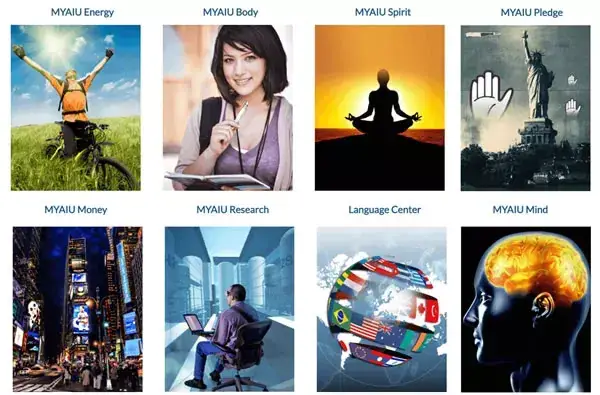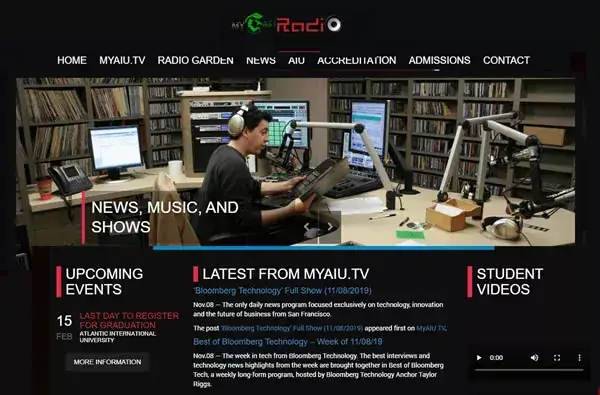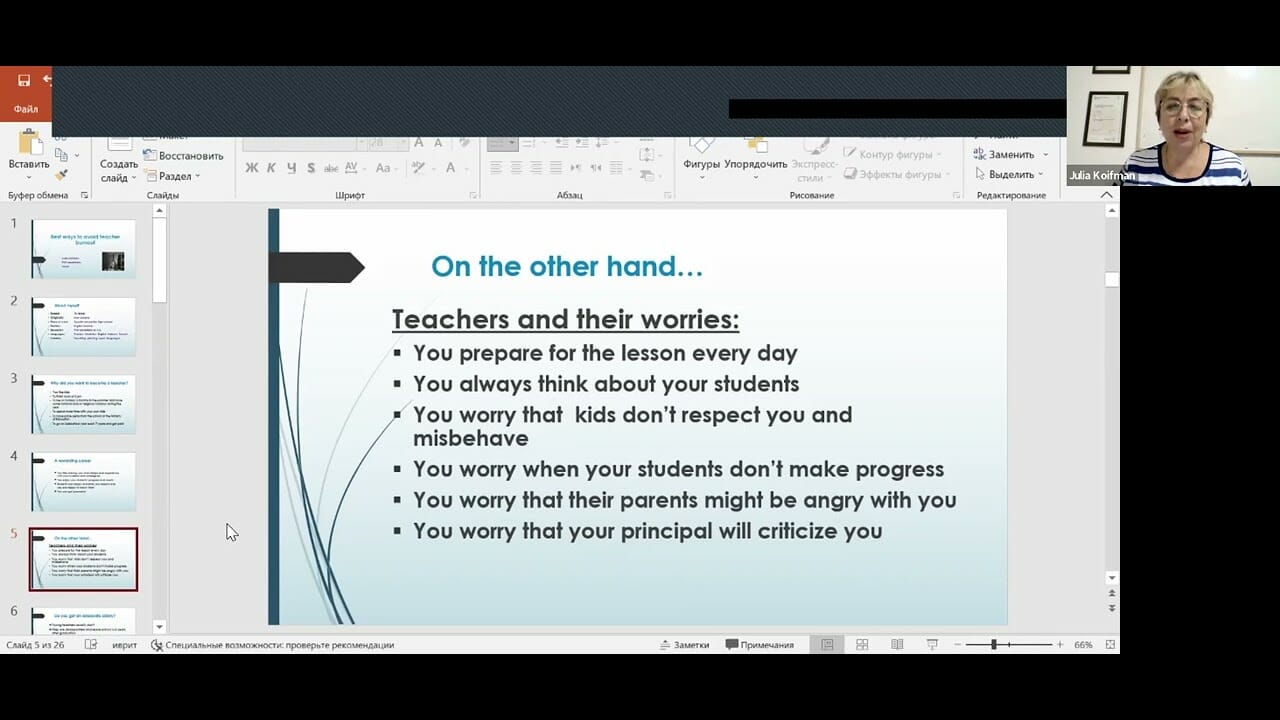- RESEARCHDistance Learning at AIU is enhanced by vast academic resources and innovative technologies build into the Virtual Campus: Hundreds of self-paced courses with video lectures and step by step lessons, thousands of optional assignments, 140,000 e-books, the Social Media & Networking platform allowing collaboration/chat/communications between students, and MYAIU develop students holistically in 11 areas beyond just academics.
- PROGRAMS OFFERED
- Areas of Study
- Courses and Curriculum
- Open Courses
- Register for a Program
- Associate Program
- Associate in Addiction Counseling
- Associate in Agriculture Food And Resources
- Associate in Anti Terrorism Security
- Associate in Behavior Analysis In Special Education
- Associate in Bioethics
- Associate in Climatology
- Associate in Cultural Theological Communication
- Associate in Culinary Arts
- Associate in Ecotechnology
- View all Associates Programs
- Bachelor Program
- Bachelors in Community Development
- Bachelors in Environmental Science
- Bachelor in Education (B.Ed, BS)
- Bachelors in Economics
- Bachelors in Entrepreneurship
- Bachelors in Financial Administration
- Bachelors in Human Resource Management
- Bachelors in Linguistics
- Bachelors in Nutritional Science
- Bachelors in Occupational Health and Safety
- Bachelors in Psychology
- View all Bachelor Programs
- Doctorate Program
- Doctor | of Biology (PhD)
- Doctorate in Business Administration (DBA, PhD)
- Doctor of Economics (PhD)
- Doctor of Electrical Engineering (D.Sc, PhD)
- Doctor of Finance (PhD)
- Doctorate in International Relations
- Doctorate in Information Technology (D.Sc)
- Doctor of Legal Studies (PhD)
- Doctor of Project Management (PhD)
- Doctor of Sociology (PhD, D.Sc)
- Doctorate in Sustainable Natural Resources Management
- View all Doctorate Programs
- Master Program
- Postdoctoral Program
- Postdoctoral in Animal Science
- Postdoctoral in Anti Terrorism Security
- Postdoctoral in Behavior Analysis In Special Education
- Postdoctoral in Bioethics
- Postdoctoral in Blockchain Technology and Digital Currency
- Postdoctoral in Business Management
- Postdoctoral in Cloud Computing
- Postdoctoral in Computer Engineering
- View all Postdoctoral Programs
AIU offers a wide range of majors in areas including the Arts, Business, Science, Technology, Social, and Human studies. More than 120 degrees and programs are available for adult learners at the associate’s, bachelor’s, master’s, doctoral and postdoctoral level. - VIRTUAL CAMPUS
Distance Learning at AIU is enhanced by vast academic resources and innovative technologies build into the Virtual Campus: Hundreds of self-paced courses with video lectures and step by step lessons, thousands of optional assignments, 140,000 e-books, the Social Media & Networking platform allowing collaboration/chat/communications between students, and MYAIU develop students holistically in 11 areas beyond just academics.
- ALUMNI
The world is YOUR campus!”, that is the message of AIU’s month magazine Campus Mundi. Hear the voices and see the faces that make up AIU. Campus Mundi brings the world of AIU to you every months with inspirational stories, news and achievements by AIU members from around the world (students and staff are located in over 200 countries).
Bachelors in Occupational Health and Safety
School of Science & Engineering
Academic Freedom to Discover Your Purpose
Open Curriculum Design at Atlantic International University
Pursuing a Bachelor’s in Occupational Health and Safety from Atlantic International University (AIU) offers a comprehensive education in ensuring workplace safety and promoting environmental health. This Occupational Health and Safety bachelor’s degree equips students with the knowledge and skills to manage safety regulations and implement effective risk management strategies.
The BA in Occupational Health and Safety program includes courses on health and safety training, workplace safety, and environmental health, preparing graduates for diverse careers in the field. AIU provides flexible undergraduate occupational health and safety programs, including an online occupational health and safety degree option, allowing students to study at their own pace.
Graduates can pursue rewarding careers in occupational health and safety, focusing on creating safer work environments, improving health outcomes, and adhering to industry safety standards. This degree opens doors to roles in various industries, emphasizing the importance of safety and health in the workplace.
Important: Below you’ll find a summary of the subjects and fields you can delve into and engage with throughout the course of your academic journey. It’s important to note that this list is neither exhaustive nor mandatory, as the graduate school programs at AIU might differ from conventional curriculum. Its main purpose is to serve as a guiding and visual aid. Are you interested in diving deeper into the curriculum framework at AIU?
Contact Us Today!
Begin Your Journey!
AIU’s Summer of Innovation and Growth gives you the ability to earn up to $5000 in tuition credit by completing free lessons and courses.
Whether you’re looking to acquire new skills, advance your career, or simply explore new interests, AIU is your gateway to a world of opportunities. With free access to 3400 lessons and hundreds of courses the ability to earn credits and earn certificates there’s no better time to start learning.
Join us today as a Guest Student and take the first step towards a brighter, more empowered future.
Explore. Learn. Achieve.
Courses and Topics in Bachelors in Occupational Health and Safety
The Bachelor’s in Occupational Health and Safety from AIU offers a diverse range of courses designed to prepare students for successful careers in the field. This Occupational Health and Safety bachelor’s degree program includes essential topics such as workplace safety, environmental health, risk management, and safety regulations. Students pursuing a BA in Occupational Health and Safety will gain practical skills in health and safety training, ensuring they are well-equipped to handle various safety challenges.
The undergraduate occupational health and safety programs also offer flexibility with an online occupational health and safety degree option, accommodating different learning styles and schedules. Core courses cover hazard identification, emergency response, ergonomics, and industrial hygiene. These comprehensive subjects prepare students for diverse careers in occupational health and safety, focusing on maintaining safe and healthy work environments. Graduates are trained to implement effective safety protocols, manage risks, and comply with regulatory standards, contributing to overall workplace safety and well-being.
- Introduction to Occupational Health and Safety
- Environmental Health and Safety
- Industrial Hygiene
- Emergency Response and Preparedness
- Occupational Health and Safety Law
- Toxicology and Hazardous Materials
- Health and Safety Training Methods
- Construction Safety
- Occupational Health Psychology
- Workplace Safety and Accident Prevention
- Risk Management and Hazard Control
- Safety Regulations and Compliance
- Ergonomics and Human Factors
- Safety Management Systems
- Fire Safety and Protection
- Incident Investigation and Analysis
- Environmental Risk Assessment
- Advanced Safety Engineering and Technology
Orientation Courses
AIU’s orientation courses for the Bachelor’s in Occupational Health and Safety program lay a solid foundation for students embarking on this crucial field of study. These initial courses introduce key concepts essential for success in an Occupational Health and Safety bachelor’s degree. Orientation topics cover fundamental aspects of workplace safety, environmental health, and risk management, ensuring students grasp the basics of maintaining safe work environments.
The BA in Occupational Health and Safety orientation courses also emphasize safety regulations and health and safety training, preparing students for advanced studies. These courses are integral to undergraduate occupational health and safety programs and are available through the online occupational health and safety degree option, providing flexibility for learners. By understanding core principles early on, students are better prepared for diverse careers in occupational health and safety, where they will implement effective safety measures, manage risks, and ensure compliance with health and safety standards in various industries.
- Communication & Investigation (Comprehensive Resume)
- Experiential Learning (Autobiography)
- Fundament of Knowledge (Integration Chart)
- Professional Evaluation (Self Evaluation Matrix)
- Organization Theory (Portfolio)
- Academic Evaluation (Questionnaire)
- Fundamental Principles I (Philosophy of Education)
- Development of Graduate Study (Guarantee of an Academic Degree)
Research Projects in Bachelors in Occupational Health and Safety
In the Bachelor’s in Occupational Health and Safety program at AIU, research projects play a crucial role in shaping students’ expertise. These projects are an integral part of the Occupational Health and Safety bachelor’s degree, allowing students to apply theoretical knowledge to real-world challenges. Through these research initiatives, students explore critical topics such as workplace safety, environmental health, and risk management.
The BA in Occupational Health and Safety program emphasizes hands-on learning, enabling students to investigate current issues related to safety regulations and health and safety training. Whether in traditional undergraduate occupational health and safety programs or the online occupational health and safety degree format, these research projects prepare students for impactful careers in occupational health and safety. By analyzing case studies and conducting field research, students develop innovative solutions to enhance safety protocols and address emerging safety concerns in various industries.
- MBM300 Thesis Proposal
- MBM302 Bachelor Thesis (5,000 words)
Publication: Students pursuing Bachelors in Occupational Health and Safety at AIU actively contribute to educational discourse through research projects, often resulting in publications in academic journals and conferences. These publications showcase their innovative approaches to teaching and learning, further solidifying AIU’s reputation as a leading institution for bachelor’s programs in Occupational Health and Safety.
Secure Your Future with a Bachelor’s in Occupational Health and Safety!
Apply Now for Admission
Transformative Bachelor’s Degree Student Journey at AIU
Embarking on a Bachelor’s in Occupational Health and Safety from AIU represents a transformative journey for students, equipping them with crucial skills for safeguarding workplace environments. This Occupational Health and Safety bachelor’s degree program offers a comprehensive education in workplace safety, environmental health, and risk management, providing a solid foundation for future careers.
Students in the BA in Occupational Health and Safety experience a blend of theoretical learning and practical application. Through undergraduate occupational health and safety programs, they delve into critical areas such as safety regulations, health and safety training, and emergency response strategies. Whether pursuing the degree through traditional classroom settings or the flexible online occupational health and safety degree format, learners benefit from an immersive educational experience.
This program prepares students for diverse careers in occupational health and safety by developing their ability to analyze safety protocols, implement effective risk management strategies, and ensure regulatory compliance. As they progress, students become adept at creating safer work environments and addressing emerging challenges in health and safety. The transformative journey through this degree not only enhances their professional capabilities but also contributes to advancing workplace safety and environmental health on a broader scale.
Community & Social
The full online education program at AIU cultivates an energetic community environment using cutting-edge technologies and collaborative tools, ensuring a nurturing academic journey. Through platforms like the Virtual Campus, Mobile APP, MYAIU, AIULink, and AIUTV, students, faculty, and alumni unite, creating a network of interconnected minds. Engaging in thought-provoking symposiums, webinars, and conferences fosters global connections among the various community members.
Accessing the Merlin Media Center provides a wealth of academic resources while staying linked through AIULink, which ensures ongoing connectivity. The AIU Virtual Campus, APP compatible with Android and iOS, offers effortless access to programs, tools, geographic information systems, and academic resources. These platforms facilitate sharing personal narratives, exploring holistic development, and contributing to the betterment of humanity, shaping an unparalleled AIU experience.
Academic Resources
At AIU, the Virtual Campus is an innovative center equipped with more than 25 specialized tools, all geared towards supporting and empowering students throughout their educational endeavors. Our newest feature, the Virtual Reality 3D immersive experience, elevates community interaction and nurtures growth, motivation, and inspiration among our diverse student population.
Also, AIU includes the leading Artificial intelligence (AI) tools such as ChatGPT, Dall-E and Midjoruney, PDF Executive Assistance, and Slide Generator, plus others, and is adding new AI tools to ensure students are fluent in this emerging trend and benefit from the boost in productivity they bring.
Within our extensive online library, comprising 260,000 books and 30 million peer-reviewed articles, alongside 105,000 resources co-curated by the AIU community, we establish an unmatched academic setting dedicated to fostering our students’ growth, development, and success.
Virtual Campus
Complete assignments online or offline at your convenience with 24/7 access to distance learning through AIU’s Virtual Campus. Step by Step guides including videos, tutorials, live webinars and examples for each course. All materials can be access on all web browsers as well as via AIU's Mobile App which brings all the features of the Virtual Camus to your Mobile Device.
My AIU Elements
MyAIU’s primary goal is to go beyond Academics, it looks to guide students through 11 elements that are key to living life optimally in all aspects. By identifying and reflecting on these key areas, an opportunity arises to holistically address them, through positive change, habits, reinforcement and tools to keep students on their chosen path.
AIU TV & Radio
The students have the opportunity to produce, edit and host their own show reaching a worldwide audience, the AIU community and giving notice of their expertise/passion in the subject. AIUTV & AIU Radio allow students to explore new ways to communicate, develop a platform and form potential collaboration with likeminded individuals.
AIU Campus Mundi
AIU Campus Mundi is a monthly magazine that gathers the most notable news and information about the university and its members in one convenient place. The magazine allows our community to be well informed, involved and keep in tough regardless of their geographic location. AIU Campus Mundi publishes, news, research, events, awards, academic achievements.
Graduation Ceremony
Each year AIU organizes graduation ceremonies where the students can assist and share their experiences with fellow students and academic members Participation in the ceremony is optional, the day’s events include conferences, research presentations, group meetings, networking, lunch and formal dinner.
Symposiums & Webinars
AIU’s symposiums serve as crucial hubs for knowledge and innovation, creating an interactive platform for students in creative fields. These events are instrumental in disseminating groundbreaking research, facilitating dynamic exchanges of ideas, and nurturing lively discussions. Participation in these symposiums exposes individuals to varied perspectives, sparking collaborative research initiatives that consistently push the boundaries of linguistics.
Live Classes
AIU introduces an innovative approach to virtual learning by incorporating dynamic live sessions twice daily. One can also access these live classes from the archive that hosts 100s of courses that can be combined to personalize a student’s academic journey. Led by seasoned faculty and experts from various industries, these sessions offer real-time discussions, interactive Q&A segments, and collaborative problem-solving, enriching your comprehension of community.
Participating in these sessions augments your expertise, equipping you to shape policies and refine your skills in engineering. AIU’s live classes promise intellectually engaging dialogues, up-to-the-minute industry perspectives, and individualized instructor feedback, guaranteeing a rewarding journey through the study of financial administration. You can access 700+ live classes, 2000+ assignments and projects, 3400 mini courses free of cost as a Guest Student to learn new skills, new abilities, and earn certificates to grow and access new opportunities in your field of interest. In fact, one can earn up to $5000 credit towards their tuition fee by completing 5 Mini-courses and/or Live classes as a Guest Student.
Feel free to glance through some of our recorded live sessions on different subjects.
Gut Health by Rebecca T
Environmental Health, Impact of environmental factors on Human health by Dr Omer Farooq K
Insight to STDs screen by Usama Jamil
Special Projects, Research, Publications, and Co-Authoring
In the Bachelor’s in Occupational Health and Safety program at AIU, special projects, research, and publications are pivotal components that enrich the learning experience. Students in this Occupational Health and Safety bachelor’s degree program engage in hands-on research and special projects that address real-world issues in workplace safety, environmental health, and risk management. These opportunities allow them to explore innovative solutions and contribute to the field through impactful findings.
The BA in Occupational Health and Safety curriculum encourages students to undertake research projects that examine safety regulations and health and safety training, promoting a deeper understanding of these critical areas. Many students also collaborate as co-authors on academic papers and industry publications, furthering their expertise and visibility in the field. Whether through traditional undergraduate occupational health and safety programs or the online occupational health and safety degree option, these research and publication experiences prepare graduates for successful careers in occupational health and safety, showcasing their ability to influence safety practices and regulations.
Study at your Own Pace with our Flexible Online Programs with OmniLean AI Assisted Course Creator.
Try it Now!
Career Center for Bachelors in Occupational Health and Safety
AIU’s Career Center plays a vital role for students pursuing a Bachelor’s in Occupational Health and Safety. This dedicated center supports individuals enrolled in the Occupational Health and Safety bachelor’s degree program, including those in the BA in Occupational Health and Safety and online occupational health and safety degree options.
The Career Center provides tailored guidance on careers in occupational health and safety, helping students navigate job markets and find opportunities in areas such as workplace safety, environmental health, and risk management. Services include resume building, interview preparation, and networking opportunities with industry professionals.
Additionally, the center aids students in understanding safety regulations and enhancing their health and safety training credentials. By connecting students with internships and employment prospects, the Career Center ensures that graduates from undergraduate occupational health and safety programs are well-prepared to enter and excel in the field, advancing their careers and contributing to safer work environments.
Job Description
A student with a Bachelor’s in Occupational Health and Safety is trained to ensure workplace safety and regulatory compliance. Their job typically involves conducting risk assessments, developing safety protocols, and implementing health and safety training programs. They monitor work environments to identify hazards, manage safety regulations, and ensure adherence to environmental health standards.
Additionally, they investigate workplace accidents, analyze incidents to prevent recurrence, and prepare reports on safety performance. The role also includes advising on ergonomics and designing emergency response plans. This position demands strong analytical skills, attention to detail, and a thorough understanding of risk management and safety regulations. Their work is crucial in creating safer, healthier work environments and promoting overall well-being in various industries.
Employment Opportunities for Bachelors in Occupational Health and Safety
Graduates are equipped to pursue roles such as:
- Safety Manager – Overseeing and implementing safety protocols to ensure a safe working environment.
- Environmental Health Specialist – Managing environmental health programs and compliance with regulations.
- Risk Manager – Identifying and mitigating risks to protect employees and company assets.
- Occupational Health and Safety Specialist – Conducting inspections and ensuring adherence to safety regulations.
- Safety Consultant – Advising organizations on best practices for workplace safety and risk management.
- Industrial Hygienist – Evaluating and controlling workplace hazards related to chemicals, noise, and ergonomics.
- Compliance Officer – Ensuring that company practices meet federal and state safety regulations.
- Health and Safety Trainer – Developing and delivering training programs on safety procedures and regulations.
- Emergency Management Coordinator – Planning and coordinating responses to emergencies and disasters.
These roles are critical in maintaining workplace safety, improving health outcomes, and ensuring regulatory compliance across various sectors, including manufacturing, construction, healthcare, and government.
Tools for Professionals with Bachelors in Occupational Health and Safety
Professionals with a Bachelor’s in Occupational Health and Safety utilize various tools to enhance workplace safety and manage risks effectively.
Key tools include:
- SPSS, SAS, or R
- EndNote or Zotero
- Tableau or Excel
- Google Workspace, Microsoft Teams, or Slack
- Qualtrics or SurveyMonkey
- PubMed, Scopus, and Web of Science
- Asana, Trello, or Jira
- Blackboard, Canvas, or Moodle
- Labster or ChemCollective
- Google Drive, Dropbox, or Microsoft OneDrive
Associations for Professionals with Bachelors in Occupational Health and Safety
Professionals with a Bachelor’s in Occupational Health and Safety can benefit from joining various associations that provide resources, networking opportunities, and professional development.
Key associations include:
- American Association of Colleges of Nursing (AACN)
- American Public Health Association (APHA)
- Association of Schools and Programs of Public Health (ASPPH)
- American Health Information Management Association (AHIMA)
- Association for the Advancement of Sustainability in Higher Education (AASHE)
- American College of Healthcare Executives (ACHE)
- American Public Health Association (APHA)
- Association for Clinical and Translational Science (ACTS)
- American Medical Informatics Association (AMIA)
- Association of Clinical Research Professionals (ACRP)
Prepare for Diverse Careers in Occupational Health and Safety, Check our Free Guest Access.
Our Guest Student Access
Bachelors in Occupational Health and Safety Requirements
To enroll in the Bachelor’s in Occupational Health and Safety program at AIU, students must meet specific requirements. Applicants should have a high school diploma or equivalent, demonstrating a foundational understanding of general education subjects. For the Occupational Health and Safety bachelor’s degree, strong analytical and communication skills are essential, reflecting the need for effective risk management and workplace safety practices.
The BA in Occupational Health and Safety program is open to individuals with a keen interest in environmental health, safety regulations, and health and safety training. Prospective students may need to submit transcripts, a resume, and a statement of purpose outlining their career goals in careers in occupational health and safety.
The program offers both traditional undergraduate occupational health and safety programs and a flexible online occupational health and safety degree option, catering to diverse learning needs and professional aspirations.
How Can You Apply?
Applying for a Bachelor’s in Occupational Health and Safety typically involves several key steps.
Here’s a general outline of the application process:
Research and Preparation:
- Research the Program: Review the specific requirements and details of the Occupational Health and Safety bachelor’s degree program at the institution you’re interested in, such as AIU.
- Prepare Documents: Gather necessary documents including your high school diploma or equivalent, transcripts, resume, and personal statement.
Application Form:
- Complete the Form: Fill out the application form, which can often be done online for both traditional and online occupational health and safety degree options.
Submit Transcripts:
- Provide Academic Records: Submit official transcripts from previous educational institutions to demonstrate your academic qualifications.
Personal Statement:
- Write a Statement of Purpose: Draft a personal statement or essay that outlines your interest in workplace safety, risk management, and environmental health, and your career goals in careers in occupational health and safety.
References and Resume:
- Provide References: Submit letters of recommendation if required, along with a current resume highlighting relevant experience and skills.
Application Fee:
- Pay the Fee: Some institutions require an application fee. Ensure this is paid as part of the submission process.
Interview:
- Attend an Interview: If required, participate in an interview to discuss your qualifications and passion for the field.
Await Decision:
- Check Status: Monitor your application status and wait for an admission decision.
For specific details, always refer to the application guidelines provided by AIU or the institution you are applying to.
Financial Support & Scholarships
We’re excited to present an array of Bachelor of Occupational Health and Safety full scholarships crafted for our students. Kindly share your details to unlock numerous Bachelors of Occupational Health and Safety scholarship possibilities to bolster your academic endeavors. Allow us to aid you in reaching your educational aspirations and fostering your scholarly pursuits.
How Much Does Bachelor in Occupational Health and Safety Cost Per Year?
We recognize the significance of financial flexibility in your educational endeavors throughout life. Hence, depending on the type of degree requirements and of program you choose, we have introduced a convenient monthly payment plan to make your pursuit of a bachelor’s degree or master’s degree more manageable and freer from financial worries. Our exceptionally affordable tuition fee covers the expense of Occupational Health and Safety programs. So, secure your future with AIU, where first-rate education aligns perfectly with your budget. Your aspirations are well within your grasp.
FAQs
What job roles can I pursue with a degree in occupational health and safety?
With a degree in Occupational Health and Safety, you can pursue various job roles including Safety Manager, Environmental Health Specialist, Risk Manager, and Occupational Health and Safety Specialist. Other opportunities include Safety Consultant, Industrial Hygienist, Compliance Officer, Health and Safety Trainer, and Emergency Management Coordinator. These positions involve overseeing safety protocols, managing environmental and workplace risks, ensuring regulatory compliance, and developing health and safety training programs. Each role is crucial for maintaining safe and compliant work environments across diverse industries.
What are the key topics covered in the occupational health and safety curriculum?
The occupational health and safety curriculum typically covers key topics such as workplace safety, risk management, environmental health, safety regulations, and industrial hygiene. Students also study emergency response and preparedness, ergonomics, toxicology, and fire safety. Additional areas include hazard identification, accident investigation, health and safety training, and safety management systems. These subjects equip students with the knowledge to implement effective safety protocols, manage risks, and ensure compliance with health and safety standards across various work environments.
How does AIU's curriculum for occupational health and safety address current industry standards and regulations?
AIU’s curriculum for Occupational Health and Safety is designed to address current industry standards and regulations by integrating up-to-date practices and guidelines into its coursework. The program covers safety regulations, risk management, and emergency response, reflecting the latest industry standards. Students engage with real-world case studies and current regulatory frameworks to ensure practical understanding. The curriculum also emphasizes health and safety training and environmental health, ensuring graduates are prepared to meet and exceed contemporary compliance requirements and effectively manage workplace safety challenges.

Contact Us
Atlantic International University
900 Fort Street Mall 905 Honolulu, HI 96813 info@aiu.edu
Quick Links
Home | Online Courses | Available Courses | Virtual Campus | Career Center | Available Positions | Ask Career Coach | The Job Interview | Resume Writing | Accreditation | Areas of Study | Bachelor Degree Programs | Masters Degree Programs | Doctoral Degree Programs | Course & Curriculum | Human Rights | Online Library | Representations | Student Publication | Sponsors | General Information | Mission & Vision | School of Business and Economics | School of Science and Engineering | School of Social and Human Studies | Media Center | Admission Requirements | Apply Online | Tuition | Faculty & Staff | Distance Learning Overview | Student Testimonials | AIU Blogs | Register for Program | Privacy Policy | FAQ































